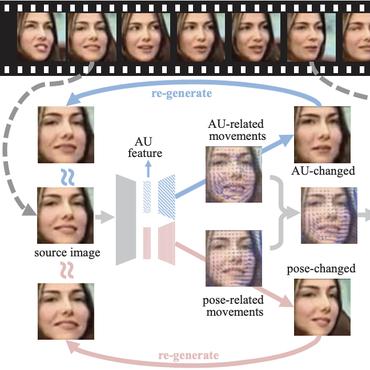Search Results for author: Zhang Xiong
Found 16 papers, 5 papers with code
Wasserstein Dependent Graph Attention Network for Collaborative Filtering with Uncertainty
no code implementations • 9 Apr 2024 • Haoxuan Li, Yuanxin Ouyang, Zhuang Liu, Wenge Rong, Zhang Xiong
We utilize graph attention network and Wasserstein distance to address the limitations of LightGCN and Kullback-Leibler divergence (KL) divergence to learn Gaussian embedding for each user and item.
A Review of Data Mining in Personalized Education: Current Trends and Future Prospects
no code implementations • 27 Feb 2024 • Zhang Xiong, Haoxuan Li, Zhuang Liu, Zhuofan Chen, Hao Zhou, Wenge Rong, Yuanxin Ouyang
Personalized education, tailored to individual student needs, leverages educational technology and artificial intelligence (AI) in the digital age to enhance learning effectiveness.
Knowledge-Driven CoT: Exploring Faithful Reasoning in LLMs for Knowledge-intensive Question Answering
1 code implementation • 25 Aug 2023 • Keheng Wang, Feiyu Duan, Sirui Wang, Peiguang Li, Yunsen Xian, Chuantao Yin, Wenge Rong, Zhang Xiong
Equipped with Chain-of-Thought (CoT), Large language models (LLMs) have shown impressive reasoning ability in various downstream tasks.
Transformer-Patcher: One Mistake worth One Neuron
1 code implementation • 24 Jan 2023 • Zeyu Huang, Yikang Shen, Xiaofeng Zhang, Jie zhou, Wenge Rong, Zhang Xiong
Our method outperforms previous fine-tuning and HyperNetwork-based methods and achieves state-of-the-art performance for Sequential Model Editing (SME).
Mixture of Attention Heads: Selecting Attention Heads Per Token
1 code implementation • 11 Oct 2022 • Xiaofeng Zhang, Yikang Shen, Zeyu Huang, Jie zhou, Wenge Rong, Zhang Xiong
This paper proposes the Mixture of Attention Heads (MoA), a new architecture that combines multi-head attention with the MoE mechanism.
Causal Intervention for Fairness in Multi-behavior Recommendation
no code implementations • 10 Sep 2022 • Xi Wang, Wenjie Wang, Fuli Feng, Wenge Rong, Chuantao Yin, Zhang Xiong
Specifically, we find that: 1) item popularity is a confounder between the exposed items and users' post-click interactions, leading to the first unfairness; and 2) some hidden confounders (e. g., the reputation of item producers) affect both item popularity and quality, resulting in the second unfairness.
PREMA: Part-based REcurrent Multi-view Aggregation Network for 3D Shape Retrieval
no code implementations • 9 Nov 2021 • Jiongchao Jin, Huanqiang Xu, Pengliang Ji, Zehao Tang, Zhang Xiong
We propose the Part-based Recurrent Multi-view Aggregation network(PREMA) to eliminate the detrimental effects of the practical view defects, such as insufficient view numbers, occlusions or background clutters, and also enhance the discriminative ability of shape representations.
Contrastive Learning for Recommender System
no code implementations • 5 Jan 2021 • Zhuang Liu, Yunpu Ma, Yuanxin Ouyang, Zhang Xiong
To solve this problem, we propose a graph contrastive learning module for a general recommender system that learns the embeddings in a self-supervised manner and reduces the randomness of message dropout.
A General Recurrent Tracking Framework Without Real Data
no code implementations • ICCV 2021 • Shuai Wang, Hao Sheng, Yang Zhang, Yubin Wu, Zhang Xiong
Based on this framework, a Recurrent Tracking Unit (RTU) is designed to score potential tracks through long-term information.
DR-KFS: A Differentiable Visual Similarity Metric for 3D Shape Reconstruction
no code implementations • ECCV 2020 • Jiongchao Jin, Akshay Gadi Patil, Zhang Xiong, Hao Zhang
We introduce a differential visual similarity metric to train deep neural networks for 3D reconstruction, aimed at improving reconstruction quality.
Similarity Based Auxiliary Classifier for Named Entity Recognition
1 code implementation • IJCNLP 2019 • Shiyuan Xiao, Yuanxin Ouyang, Wenge Rong, Jianxin Yang, Zhang Xiong
The segmentation problem is one of the fundamental challenges associated with name entity recognition (NER) tasks that aim to reduce the boundary error when detecting a sequence of entity words.
 Ranked #18 on
Named Entity Recognition (NER)
on WNUT 2017
Ranked #18 on
Named Entity Recognition (NER)
on WNUT 2017
AlphaStock: A Buying-Winners-and-Selling-Losers Investment Strategy using Interpretable Deep Reinforcement Attention Networks
no code implementations • 24 Jul 2019 • Jingyuan Wang, Yang Zhang, Ke Tang, Junjie Wu, Zhang Xiong
Recent years have witnessed the successful marriage of finance innovations and AI techniques in various finance applications including quantitative trading (QT).
Sequential Attention with Keyword Mask Model for Community-based Question Answering
1 code implementation • NAACL 2019 • Jianxin Yang, Wenge Rong, Libin Shi, Zhang Xiong
So the QA pairs capture features and information from both question text and answer text, interacting and improving vector representations iteratively through hops.
Understanding Urban Dynamics via Context-aware Tensor Factorization with Neighboring Regularization
no code implementations • 25 Apr 2019 • Jingyuan Wang, Junjie Wu, Ze Wang, Fei Gao, Zhang Xiong
In this paper, we propose a Neighbor-Regularized and context-aware Non-negative Tensor Factorization model (NR-cNTF) to discover interpretable urban dynamics from urban heterogeneous data.
Confidence Preserving Machine for Facial Action Unit Detection
no code implementations • ICCV 2015 • Jiabei Zeng, Wen-Sheng Chu, Fernando de la Torre, Jeffrey F. Cohn, Zhang Xiong
Varied sources of error contribute to the challenge of facial action unit detection.
Word Embedding based Correlation Model for Question/Answer Matching
no code implementations • 15 Nov 2015 • Yikang Shen, Wenge Rong, Nan Jiang, Baolin Peng, Jie Tang, Zhang Xiong
With the development of community based question answering (Q&A) services, a large scale of Q&A archives have been accumulated and are an important information and knowledge resource on the web.










